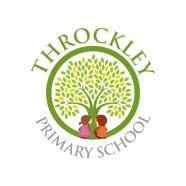
Collective Worship Policy
Coordinator: Katie McGregor
Updated: September 2024
To be reviewed: September 2025


Coordinator: Katie McGregor
Updated: September 2024
To be reviewed: September 2025
Philosophy
Worship is an important part of the school day as it gives us the opportunity to come together as a community. It can take place in assemblies; both whole school and class based, and can be attended by all students, staff and any visitors in school. Collective worship is closely connected to our Thrive curriculum and activities are planned for daily reflection. The Collective Worship topics are recorded by the senior leadership team, RE Coordinator and Personal Development lead.
At Throckley Primary School we recognise that collective worship is an important opportunity to provide opportunities for our pupils’ spiritual, moral, social and cultural development.
Using guidance from the syllabus established by the local Standing Advisory Council for Religious Education (SACRE), collective worship reflects the different religious traditions in Britain. These are mainly Christian, however we importantly address the teaching and practices of the other principal religions represented in Britain.
We promote all fundamental British Values, ensuring that all are focused on throughout the academic year. We reflect the religious backgrounds represented in our community in collective worship and actively promote British Values such as mutual respect during this time. As a school, we are constantly encouraging our pupils to regard people of all faiths, races and cultures with respect and acceptance.
Aims
It is our aim that worship should:
Contribute to the spiritual, social, moral, and cultural development of each child, establishing a strong community ethos supported by effective relationships throughout our school.
Encourage respect for other people, and promote acceptance and harmony between different cultural traditions by enabling pupils to acquire an appreciation of and respect for their own and other cultures.
Support the social and emotional development of our pupils through making use of our PSHE and Zones of Regulation programmes.
Use expression to reaffirm and practise the values of the school community.
Allow reflection and response to the fundamental questions of life and those things that are of eternal concern and value to human beings.
Celebrate and give thanks for occasions of significance, including festivals, and the achievements within the school, and local and international community.
Foster and enable a concern for the needs of others, recognising the vulnerability of self and others.
Provide members of the school community with the opportunity to experience stillness and quiet.
Provide members of the school community with the opportunity to respond to Christian language and symbolism.
Provide members of the school community with the opportunity to experience a variety of forms of prayer and meditation. These might include praise, seeking forgiveness, asking on behalf of self and others, or quiet reflection.
To help students begin to understand the nature and purpose of worship.
Provide a foundation for a mature understanding and practice of worship in the future.
Use teaching resources from a wide variety of sources to help understand a range of faiths.
The 1988 Education Reform Act requires that “all pupils in attendance at a maintained school shall on each day take part in an act of Collective Worship”. We seek to do our best to keep the spirit of this legislation by providing as many high quality acts of worship as is practically possible.
To provide students with variety in their experience of worship, acts of worship may take the form of a whole school act of worship for all pupils, or separate acts of worship for students in different age or school groups. Collective Worship may be held at any time during the school day.
Acts of Collective Worship at Throckley Primary take into account the student’s ages, aptitudes and family backgrounds.
The Head Teacher and Governors, on advice from the RE Subject Leader, may apply for a determination from SACRE if there are a large number of pupils in the school from a particular non-Christian faith background.
The school recognises that there is a difference between Acts of Collective Worship and the assembly of students. On some occasions, assembly may proceed or follow an Act of Collective Worship. When this happens, the transition from Assembly to Worship will be marked in a suitable way e.g. the lighting of a candle / reflecting on an image on the IWB / moments of silence and reflection. Each act of Collective Worship will be documented accordingly, and we will keep a record of worship themes and content.
We seek to be an inclusive school community; however we respect the rights of parents to withdraw their children for Collective Worship. Throckley Primary School expects that withdrawal will only be made following parental discussion with the Head Teacher/worship co-ordinator, followed by written confirmation of withdrawal.
The school has a system of suitable supervision for students withdrawn from Acts of Collective Worship. However no additional work is set or followed in this time.
All teachers, including the Head Teacher, have the right of withdrawal from the Act of Collective Worship, but the Head Teacher, should they wish to exercise this right, maintains statutory accountability for Acts of Collective Worship. This right of withdrawal does not extend to assemblies.
We seek to encourage pupils to voice their views on Collective Worship and to be a part of the evaluation process. The Student Council regularly seeks the views of their classmates and reports these findings to the School Council.
Updated: September 2024
Next Review: September 2025